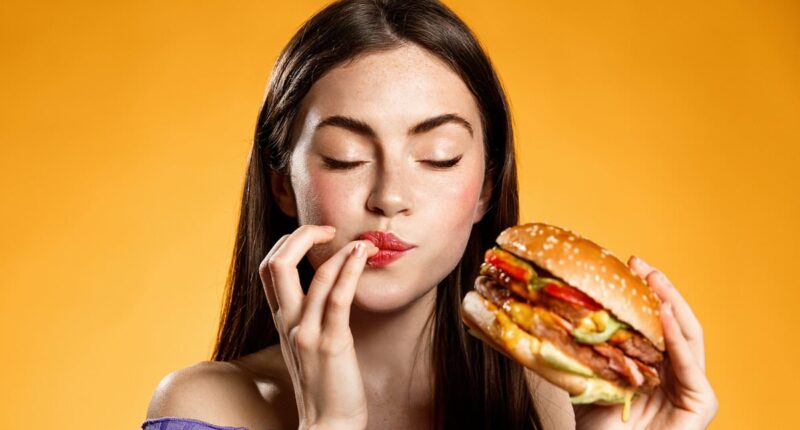According to a wise individual, humans have the unique ability to create their own food, yet are foolish enough to consume it as well. This statement may hit close to home as you reflect on your own habits. If you find yourself struggling with being overweight and knowing what changes you need to make to eat more healthily – such as cutting out unnecessary calories and sugars, avoiding treats like sweets, crisps, and ice cream – the solution seems straightforward: just stop purchasing these items.
However, despite this knowledge, you might still catch yourself at the supermarket, filling your cart with the very products you’ve sworn off. It can almost feel as though an unseen force is compelling you to reach for soft drinks, crisps, and chocolate.
Once you return home, you may think to yourself, “Perhaps I should have a carrot instead.” But then the thought creeps in, “Would it really be so terrible to indulge in just one chocolate bar?” Giving in to this temptation leads to feelings of guilt and self-blame. You may scold yourself for lacking willpower, categorize yourself as weak and defeated, and ultimately continue to indulge in these unhealthy choices.
If this scenario rings a bell, you’re not alone.
As a health coach with thousands of clients, I can attest that this behaviour is all too common.
This bothers me not only because of all the unnecessary personal suffering it causes, but because I know this really has little to do with individual willpower. Powerful commercial forces are aligned to influence what you put in your mouth, trying to thwart your ambition to make healthy choices.
They do so for the simple reason that they aren’t earning a penny from carrots or broccoli.
Ultra-processed fake food – similar to real food but with more flavour, fat, salt and sweetness – is the money-spinner. For the big food corporations, whose 25 largest players turned over £1.4 trillion in 2023, profit trumps everything else, and what sells the best is fast food and products with lots of sugar.

Research shows that, for adults in the UK, close to 60 per cent of calories come from ultra-processed products

Pizza, chips and other fast food

Johannes Cullberg: Ultra-processed fake food – similar to real food but with more flavour, fat, salt and sweetness – is the money-spinner
And so these companies – the likes of Nestle, Pepsi, Coca-Cola, Mondelez (which owns Oreo and Philadelphia among other brands) and Brazil’s JBS, the largest meat producer in the world – spend most of their research and development budget on maximising the profitability of those items.
As a result, they keep getting better at selling them, which, in turn, creates even greater demand.
As this cycle continues, we consumers are faced with a growing flood of products that are damaging our health and making us fat.
Research shows that, for adults in the UK, close to 60 per cent of calories come from ultra-processed products, and as much as 65 per cent for younger people. We are in a battle over our own health. But because of the influence that Big Food has on our food choices – largely without our knowledge – the odds are stacked against us.
Big Food companies with turnovers that dwarf many countries’ GDPs have spent decades identifying the specific moments where you and I are at our weakest, and thus the most susceptible to their tricks. They also spend vast sums sponsoring influencers who post strong opinions on social media on what healthy food really is and ridicule and belittle anybody who disagrees.
If somebody publishes research findings that paint their products in a negative light, they pay their own trusted researchers to quickly publish a study of their own that proves the opposite.
These vast international food companies hold influence over the highest levels of power in every country. Their tendrils reach everywhere, including into national dietary guidelines produced as advice for the general public. This gives them the ability to shape our eating habits in ways that we might never even realise.
They affect how we think (and how we think we ought to think) about food, on an individual level as well as globally.

A can and a glass of Pepsi. The beverage was created and developed in 1893

Boxes of KitKat cereals, part of food giant Nestle’s portfolio
This gives them an edge. The less certain you are about what you should eat in order to be healthy, the easier you are to influence – which will make you a more profitable customer.
I am well placed to make these criticisms of Big Food because for years I was part of it.
I worked in Norway for Lidl, the German chain of hard-discount supermarkets, and was sent to Germany to learn how to do business with the major suppliers, like Nestle, Coca-Cola and Danone.
I learned how food could be produced at the lowest possible cost, and how advertising and loss-leader pricing (a marketing ploy in which products are sold at a loss to attract customers) were used to lure people into the shops.
Soft drinks, frozen pizzas, ready meals, ice cream, sweets and alcoholic beverages were the top sellers – products I knew weren’t good for people. Naively, I tried to add more healthy options to the product range. My German bosses laughed at me and told me they wouldn’t sell. They were right. Cheap, calorie-dense and tasty fast food always outsells more expensive, nutritious and healthy food.
After three years, I left, unhappy at what I had seen behind the scenes at Lidl and all the other supermarket chains. This was an industry that refused to take any responsibility for the health of the people who consumed its products. Everything the companies did was aligned with their cynical focus on maximising sales.
The products, the pricing, the multi-buy promotions and the placement of the products in the store and on the shelves were all arranged to convince people to buy food that was a poor choice for their health.
I decided to hit back, opening my own supermarket chain in my homeland of Sweden, one that refused to sell ultra-processed products, and, instead, celebrated real, local and organic food.

Unhealthy foods including donuts, crisps, icecream, and french fries
With a blacklist of more than 200 additives, ingredients and raw materials we wouldn’t sell, we launched the first shop in June 2015 in Stockholm, followed by three more. Our customers loved us, knowing everything had been verified as healthy, real food before it was allowed on to the shelves.
The established supermarkets tried to stop us, using every dirty trick they could. When we looked for more premises to expand, a local estate agent said he’d been warned off doing business with us by one of the big chains.
Despite this, we achieved profitability in two out of four stores within a relatively short time – only for the Covid pandemic to devastate our turnover overnight and push us into bankruptcy.
But I was determined to carry on my campaign against Big Food and so switched careers, expanding my knowledge and becoming a nutrition coach to promote healthy eating.
For Big Food, the attraction of ultra-processed food is that it has a long shelf life, low production costs and virtually no deviations in production. Fake foods, in other words, look perfect, taste the same every time, and are sold at much lower prices than real food.
They are designed to increase sales and maximise profits by inducing over-consumption.
But they are the product of industrial processes in which raw materials are broken down at a molecular level and then restructured to give the exact properties desired in terms of texture, flavour and appearance.
Ultra-processed foods often contain preservatives, flavour enhancers, colourings and sweeteners. They are likely to be energy dense and contain little nutrition.
When regularly consumed in large quantities, they can cause obesity, type 2 diabetes and other chronic health problems.
They are also designed by the neuroscientists, chemists and other scientists employed by Big Food to be addictive.
When formulating new products they use MRI scans to study how the brain’s reward centres respond to different combinations of salt, sweet and fat to maximise dependency. In the lab, additives are then combined to create fake-food items that we will find virtually irresistible.
It is a shock to discover that much of the knowledge Big Food is using today is based on research originally done by the Big Tobacco corporations years ago to distil the addictive effects of nicotine.
Today, there’s hardly anyone who challenges the notion that smoking is bad for you. But for a very long time that truth was vehemently denied by the tobacco companies. In the same way, Big Food is trying to protect its interests, despite the fact that the health risks posed by ultra-processed fake food are well documented.
In the past, tobacco was the leading cause of lifestyle diseases and premature death. But now, ultra-processed food has taken over this undesirable No 1 spot. It’s estimated that 11 million people die each year because of unhealthy diets, compared with about 8 million deaths from tobacco.
The world is facing a great challenge when it comes to our eating habits and our health. Big Food wants us to abandon our own ideas concerning what’s healthy, in order to make us believe their products are our best options.
It even tries to fool us by making laughable health claims.
I recall seeing a granola that said ‘no sugar added’ on the front of the package when the other side revealed the product was almost 25 per cent sugar. There’s only one reason for health claims of this kind: they boost sales.
My basic rule of thumb therefore is to avoid all food products that feature health claims on the front. If you read something along the lines of ‘high fibre content’ or ‘X grams of protein’, you can safely assume that this message is an attempt to distract you from the product’s poor nutritional value or high calorie density. Real food never has health claims.
It’s things like this that leave consumers increasingly uncertain how to eat healthily and so likely to be tempted to turn to ‘evidence-based’ research for answers. But this is often bought or produced by Big Food itself.
Take, for example, Coca-Cola, whose marketing tactic has been to shift blame from its own products to the lifestyle choices of its consumers.
It was revealed as having recruited some influential scientists to publish articles in medical journals, attend conferences and write social media posts intended to sway public opinion that physical exercise was the way to combat obesity rather than limiting consumption of sugary drinks. Coca-Cola is not alone.

Ultra-processed foods often contain preservatives, flavour enhancers, colourings and sweeteners
In 2015, Monsanto, another food giant (now owned by Bayer) was reported as attempting to influence scientists to paint its products in a more favourable light.
Then, in 2022, it was revealed that the Academy of Nutrition and Dietetics, the US’s most distinguished association of dieticians and nutritionists, had been showered with several millions of dollars of sponsorships by the likes of Nestle, PepsiCo, Hershey, Kellogg’s and General Mills, a huge manufacturer that counts Haagen-Dazs ice cream among its products.
These companies were funding fake research to deter criticism and boost the sales of their products. The academy had downplayed the dangers of sugar and processed foods in its guidelines, in the face of overwhelming evidence to the contrary.
So when it comes to research, it is vital to subject any information presented as based in science to critical scrutiny. Whenever you see claims that contradict the health risks associated with ultra-processed food, ask yourself where the funding for the research might have come from and who stands to benefit from this message.
The same cautionary approach is necessary for food scares about bacteria or toxins in natural or organic food, which always come out favouring Big Food.
It frightens me that, whenever there is a report of a salmonella outbreak in chicken or pesticide residue on vegetables, it strengthens the case for choosing the safe, packaged and long-lasting options Big Food offers.
Environmental toxins in fish and other natural foods are often brought up as reasons to choose industrially produced alternatives, to drive us further away from natural, healthy foods.
Because the fact is that Big Food really doesn’t want to see you going shopping for good, local produce in order to cook your family dinner. They would rather see you relaxing on the sofa with a steady supply of crisps and soft drinks.
They know exactly how stressed parents feel, and they know what buttons to press to make us more likely to give in to temptation.
That’s why a lot of advertising effort goes into making us value relaxing together after a long week by snacking in front of the telly, and labelling this as ‘quality’ family time. Happy families are shown sharing crisps, soft drinks, pizza and other ultra-processed products.
Big Food has capitalised on our desire to unwind and relax to create a cultural ritual that no Friday night is complete without lots of snacks and fast food. Worryingly, our children are quick to learn this, too.
- Adapted from Unprocess Your Diet In 30 Days, by Johannes Cullberg, out now and published by Little Brown Book Group, priced £16.99. To order a copy for £15.29 (valid until 08/02/25) with UK p&p free on orders over £25, go to mailshop.co.uk/books or call 020 3176 2937

















